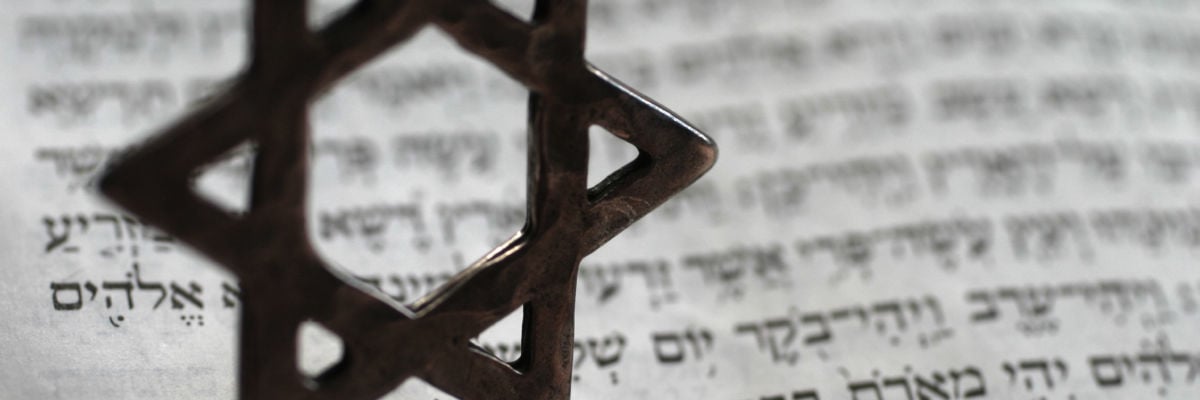
On August 11, Pope Francis gave a general audience where he provided spiritual reflection on Paul’s letter to the Galatians. In one part of the address, Pope Francis said this of the Mosaic Law:
The Law, however, does not give life, it does not offer the fulfillment of the promise because it is not capable of being able to fulfill it. The Law is a journey, a journey that leads toward an encounter. . . . Those who seek life need to look to the promise and to its fulfillment in Christ.
In an article published Wednesday in America magazine, Rabbi Daniel Polish recounted how the International Jewish Committee on Interreligious Consultations “quickly sent a letter expressing grave concern about the pope’s words. Jews engaged in dialogue with the Church expressed profound, personal dismay.” Polish himself published an editorial explaining “why Pope Francis’ comments on the Torah were hurtful to his Jewish friends.”
Before I explain what’s wrong with rabbi Polish’s criticism, I should note that there is an inconsistency in his view about “hurtful words.”
Jewish leaders like Polish are concerned that the pope essentially said a central feature of their religion (the Torah) is worthless, or at least insufficient to truly meet their spiritual needs. But those same leaders have no problem saying Jesus of Nazareth is not the Messiah, is not divine, and did not rise from the dead. I don’t consider these “hurtful words.” They are what I’d expect from people who do not believe that Christianity is true. Polish himself has said, “Jesus plays no role in our religious life as Jews.”
Instead of being offended, I would consider these words an opportunity to dialogue about Jesus and show why he should play an important role for a Jew who wants to be faithful to God.
Now, it is possible to treat a religion one considers false in a hurtful way. And Rabbi Polish commends Pope Francis for opposing anti-Semitism and celebrating Judaism’s and Christianity’s joint spiritual heritage. But nothing the pope said contradicted his previous charitable stance, which can be clearly seen in the context of the pope’s remarks about the letter to the Galatians.
Galatians is one of Paul’s most contentious letters, and he vigorously challenges fellow Jews who were claiming that in order to be a good Christian, you first have to be a good Jew. For example, they claimed that Gentiles who converted to Christianity had to be circumcised in order to be saved. Paul was so incensed by their demands that he said they had “cut themselves off from Christ” and even suggested they castrate themselves if they value circumcision so much (Gal. 5:12)!
Paul’s words are harsh, but in the first century, disputes in the Jewish community could be very harsh. For example, Josephus and the authors of the Dead Sea scrolls use harsh language and even invoke divine curses upon other Jews who disagree with them (the latter of which is not found in the New Testament). So Paul’s remarks should not be seen as an outsider’s anti-Semitic attack on Judaism, but as the plea of a “new Covenant Jew” telling his Jewish peers that the Mosaic law is not intended to be the only covenantal foundation for God’s people.
Paul says the Law was a paidagogos, or a kind of babysitter or tutor meant to accompany God’s people until it was no longer needed for that purpose (Gal. 3:24). Obedience to things like the Ten Commandments is still necessary for salvation, but the obedience itself is not what saves us. Paul says, “For if a law had been given which could make alive, then righteousness would indeed be by the law. But the scripture consigned all things to sin, that what was promised to faith in Jesus Christ might be given to those who believe” (vv. 21-22).
So when Pope Francis says the Mosaic Law does not “give life,” he is not saying the Law is worthless. Paul himself makes no such claim. He even says, “The Law is holy, and the commandment is holy and just and good” (Rom. 7:12). In a subsequent address, Pope Francis prayed on behalf of the Jews celebrating Rosh Hashanah, “May the new year be rich with fruits of peace, and good for those who walk faithfully in the law of the Lord.”
The Mosaic Law is good, but it is not sufficient. Pope Francis was essentially quoting Paul’s declaration that the law does not give eternal life; only Christ does. And Christ does this not by abolishing or replacing the Law, but by fulfilling it (Matt. 5:12) and bringing it to its proper end. Pope Benedict XVI said, “The law remains valid, even if it must be read anew in new situations. But this new reading is neither a repeal nor a substitution but a deepening in unaltered validity. There is really no substitution here.” (For more on replacement theology and Pope Benedict XVI, see this article).
This is important because Polish accuses Francis of endorsing “supersessionism,” which he says “holds that the religion of the Jews, that Torah, is antiquated and outmoded. It has been replaced in God’s favor and design by a “new Israel”—the Church Triumphant. . . . It leaves no room for Jews and Judaism in God’s plans for the world.” Polish also says the Second Vatican Council obliges Catholics to “accept the faith of Jews as a spiritual equal.”
There are two errors we must avoid concerning the relationship between Christianity and Judaism.
On the one hand, Christians must recognize that Judaism is unique among all non-Christian religions. That’s why the Church condemned heresies like Marcionism, which repudiated the Old Testament. The Catechism says, “The Old Testament is an indispensable part of Sacred Scripture. Its books are divinely inspired and retain a permanent value, for the Old Covenant has never been revoked” (121). The Second Vatican Council said, “Although the Church is the new people of God, the Jews should not be presented as rejected or accursed by God.”
But on the other hand, this does not mean that Judaism and Christianity are “spiritual equals” in the sense that it makes no difference to which religion one belongs. Although evangelism to Jews must be sensitive of abuses and evils that took place in the past, it cannot, out of fear of causing offense, abdicate the duty to share the truth about Jesus the Messiah (or “the Christ”) with those who have kept the promises of Abraham.
When someone tells me my words were “hurtful,” I sometimes ask him, “How could I have communicated my message with different words that aren’t hurtful?” In some cases, the critic asks me to use words that completely contradict my message (e.g., God loves “same-sex marriage”). When that happens, I tell him that what he found hurtful wasn’t the words I used, but the truth I shared.
I suspect that Rabbi Polish and other Jews (not to mention Muslims and other non-Christians) would find it hurtful to say, “There is salvation in no one else, for there is no other name under heaven given among men by which we must be saved” (Acts 4:12). But instead of focusing on offense at a “hard saying,” our Jewish brothers and sisters should take heart, because God has given them special gifts to recognize God’s anointed one, the Messiah. Jesus himself said, “Salvation is from the Jews” (John 4:22), and this salvation was given to us through a God who chose to be born of a Jewish woman under the law (Gal. 4:4) so that we could live in freedom under the law of Christ (6:2).



